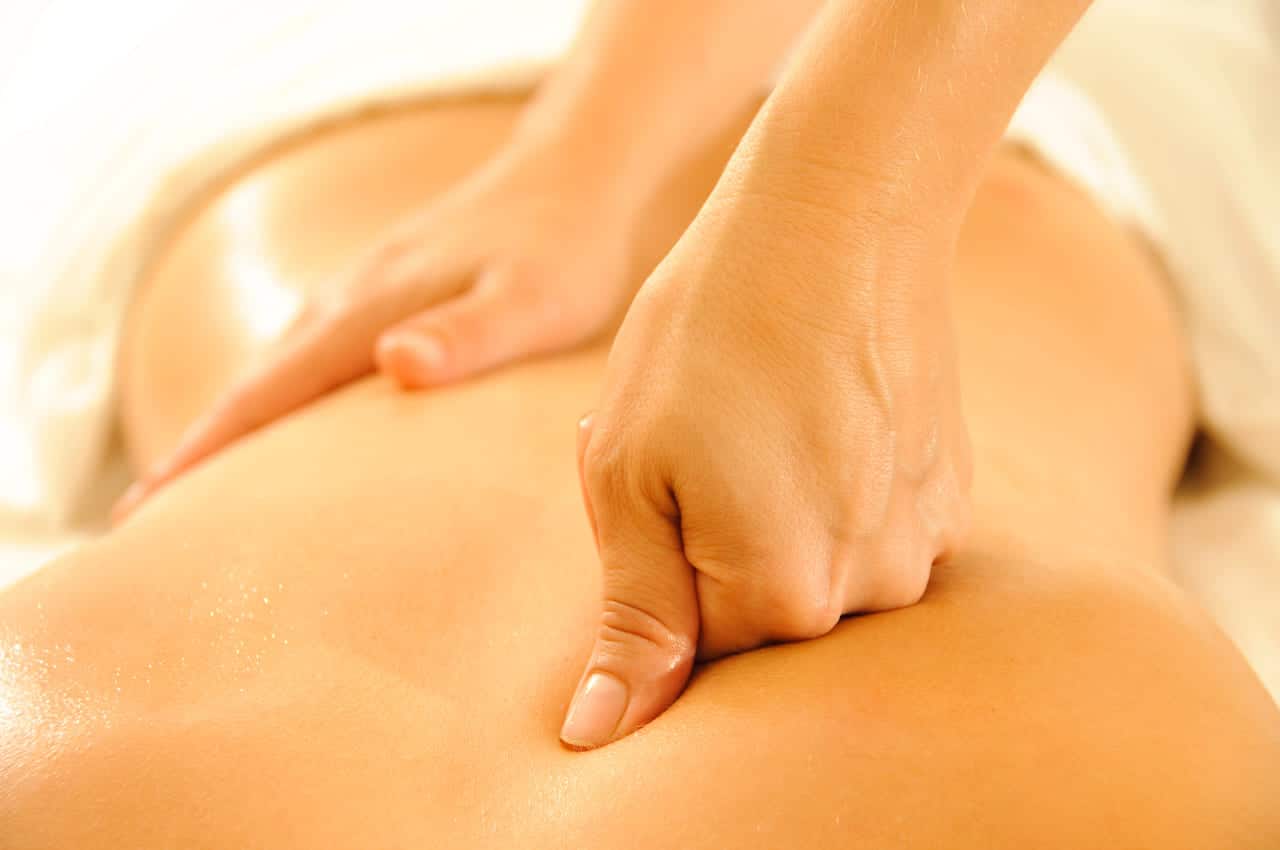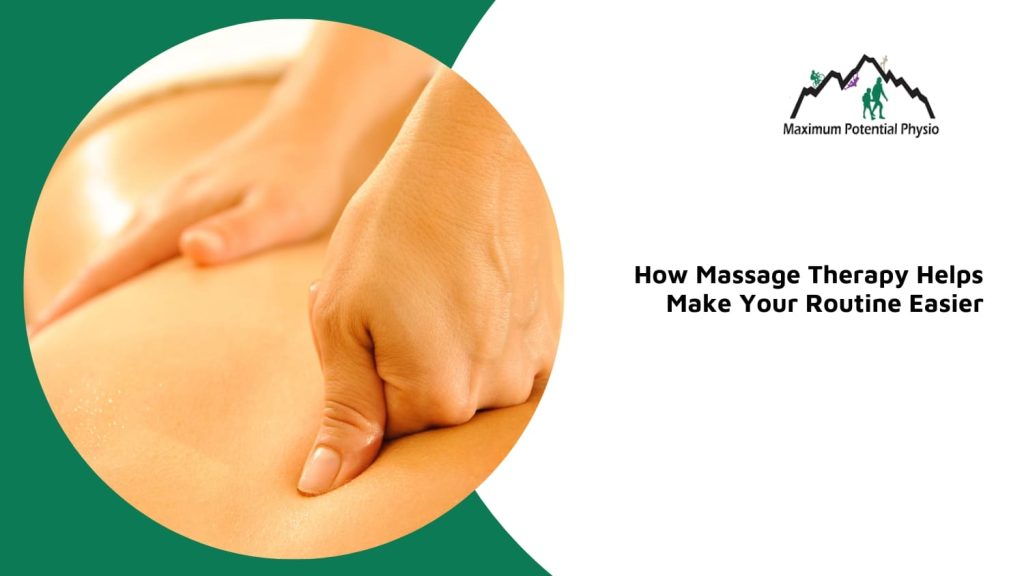How Massage Therapy Helps Make Your Routine Easier

Massage therapy is not just a luxury reserved for pampering retreats; it is a powerful tool that supports various aspects of our daily lives. Whether you're an athlete, a busy professional, or someone dealing with chronic pain, massage therapy can offer significant benefits for everyday life. In this blog, we will explore how massage therapy enhances mobility, flexibility, and posture, aids in managing chronic pain, reduces stress, and supports overall well-being.
How Massage Therapy Benefits Mobility and Flexibility
Massage therapy plays a fundamental role in improving mobility and flexibility, which are crucial for performing everyday activities smoothly. The techniques used in massage therapy, such as kneading and stretching, help to elongate muscle fibres and break down adhesions, which are bands of painful, rigid tissue. This process enhances the range of motion in joints and increases flexibility, allowing for more fluid and less restricted movement.
Regular massage therapy sessions can also facilitate quicker recovery from injuries by promoting blood circulation, which delivers oxygen and nutrients to the muscles and tissues. Improved circulation helps to reduce muscle stiffness, a common barrier to flexibility. Moreover, massage therapy stimulates the production of natural lubricants between muscle fibres, which reduces friction and makes it easier for muscles and joints to move past one another. This not only enhances mobility but also prevents the risk of future injuries, making it an invaluable part of a holistic approach to maintaining a healthy and active lifestyle.
Daily Tasks That Become Easier With Regular Massage Therapy
Regular massage therapy can make many daily activities more manageable and enjoyable. By improving the body's overall function, it eases the burden of physical tasks that might otherwise be challenging.
- Walking and Climbing Stairs: Improved muscle function and reduced stiffness make walking and climbing stairs smoother and less taxing.
- Lifting and Carrying Objects: Enhanced flexibility and strength help in lifting and carrying groceries or other heavy items without strain.
- Household Chores: Tasks such as vacuuming or gardening become less of a chore with increased endurance and decreased muscle fatigue.
- Driving: Better posture and reduced tension can alleviate the discomfort often associated with long drives.
- Reaching and Bending: Enhanced joint flexibility makes reaching for objects on high shelves or bending to tie shoelaces less cumbersome.
- Cooking and Baking: Improved dexterity and reduced hand stiffness make chopping, stirring, and kneading less tiring.
- Playing with Children: Increased energy levels and reduced pain allow for more active playtime without discomfort.
Massage therapy not only enhances the physical capacity to perform everyday tasks but also improves the overall quality of life by reducing discomfort and fatigue.
Managing Chronic Pain: How Massage Therapy Helps
Massage therapy is an effective method for managing chronic pain, which can significantly interfere with daily activities. By focusing on specific areas of discomfort, massage therapy helps to alleviate pain through a variety of mechanisms. The pressure applied during a massage stimulates the release of endorphins, which are natural pain relievers produced by the body. This not only reduces the sensation of pain but also enhances mood, providing a dual benefit.
Moreover, massage therapy increases blood flow to affected areas, which helps to reduce inflammation and promote recovery. This is particularly beneficial for individuals with conditions such as arthritis or fibromyalgia, where chronic pain is accompanied by inflammation. The manual manipulation of soft tissues during a massage also helps to break down scar tissue and adhesions, which can restrict movement and cause pain. By addressing these physical barriers, massage therapy restores function and reduces discomfort.
Additionally, regular massage therapy sessions can help in identifying and addressing pain patterns, allowing for a more targeted approach to pain management. This proactive strategy not only alleviates current pain but also prevents future occurrences, making it an essential component of comprehensive chronic pain management.
Massage Therapy’s Impact on Daily Stress and Mental Fatigue
In today's fast-paced world, stress and mental fatigue are common issues that can impact our well-being. Massage therapy offers a natural solution to alleviate these challenges.
- Reduces Cortisol Levels: Regular massage therapy sessions can lower cortisol, the stress hormone, promoting relaxation and reducing anxiety.
- Enhances Mood: The release of endorphins during a massage can boost mood and provide a sense of well-being.
- Improves Concentration: By alleviating tension, massage therapy can enhance mental clarity and focus, making it easier to concentrate on tasks.
- Promotes Relaxation: Techniques used in massage therapy induce a state of relaxation, which can counteract the effects of stress.
- Increases Mindfulness: Massage encourages a connection between mind and body, promoting mindfulness and reducing mental fatigue.
- Encourages Better Sleep: By reducing stress and promoting relaxation, massage therapy can lead to improved sleep quality and duration.
Massage therapy is a valuable tool for managing stress and mental fatigue. By integrating regular sessions into your routine, you can improve mental health and overall quality of life.
How Massage Therapy Affects Everyday Activities for Active Individuals
For athletes and active individuals, maintaining peak performance is essential. Massage therapy offers numerous benefits that can enhance performance and aid recovery.
- Reduces Muscle Soreness: Post-exercise massages can alleviate muscle soreness, allowing for quicker recovery and continued training.
- Enhances Flexibility: Improved flexibility from massage therapy can lead to better performance and reduced injury risk.
- Boosts Circulation: Enhanced blood flow delivers more oxygen and nutrients to muscles, improving endurance and strength.
- Speeds Recovery: Massage therapy aids in flushing out metabolic waste from muscles, speeding up recovery time.
- Improves Muscle Function: By addressing muscle imbalances, massage therapy can enhance overall muscle function.
- Prevents Injuries: Regular massage therapy can identify and address potential problem areas, reducing the risk of injuries.
Massage therapy is a vital component of an athlete's routine, offering benefits that enhance performance, prevent injuries, and promote faster recovery.
Improved Sleep and Recovery: The Benefits of Massage Therapy
A good night's sleep is essential for overall health and recovery. Massage therapy can significantly contribute to better sleep quality and faster recovery.
- Encourages Relaxation: Techniques utilized in massage therapy foster a state of calm, contributing to deeper and more restorative sleep.
- Reduces Insomnia Symptoms: Regular sessions can alleviate symptoms of insomnia by reducing stress and promoting relaxation.
- Enhances Sleep Quality: By reducing muscle tension and stress, massage therapy can improve the quality of sleep.
- Speeds Muscle Recovery: Enhanced circulation from massage therapy aids in faster muscle recovery during sleep.
- Balances Hormones: Massage therapy can regulate hormones associated with sleep, such as serotonin and melatonin.
- Improves Overall Rest: By reducing pain and discomfort, massage therapy enhances the overall quality of rest and recovery.
Massage therapy is an effective method for improving sleep and recovery, offering benefits that contribute to overall well-being.
How Often Should You Get Massage Therapy for Optimal Benefits?
The frequency of massage therapy sessions depends on individual needs and goals. For those dealing with chronic pain or recovering from an injury, more frequent sessions, such as weekly or bi-weekly, may be beneficial. This allows for consistent management of symptoms and supports the recovery process.
For individuals seeking general maintenance and stress relief, a monthly session may suffice. This helps to prevent the buildup of tension and maintain overall well-being. Athletes or those with high physical demands may benefit from more frequent sessions, particularly during training periods or after competitions, to aid recovery and performance.
It's important to consult with a massage therapist to tailor a schedule that meets your specific needs. They can provide guidance based on your lifestyle, health goals, and any specific issues you may be facing. Ultimately, the key is to find a balance that supports your health and enhances your quality of life.
Can Massage Therapy Help With Work-Related Aches From Sitting or Repetitive Tasks?
Many individuals experience discomfort due to prolonged sitting or repetitive tasks at work. Massage therapy can offer significant relief for these common issues.
- Alleviates Neck and Shoulder Tension: Regular massage therapy can relieve the tension that accumulates in the neck and shoulders from prolonged sitting.
- Reduces Lower Back Pain: Techniques that focus on the lower back can alleviate pain from sitting for extended periods.
- Improves Wrist Function: Massage therapy can ease discomfort and improve function in wrists affected by repetitive movements.
- Enhances Circulation: Better circulation helps to reduce the swelling and discomfort associated with desk work.
- Boosts Energy Levels: By reducing tension, massage therapy can increase energy levels, improving work performance.
- Relieves Eye Strain: Techniques that promote relaxation can also alleviate tension around the eyes.
Massage therapy can significantly improve comfort and function for individuals experiencing work-related aches, enhancing overall productivity and well-being.
Making Your Day Easier
Massage therapy is a versatile and powerful tool that can significantly enhance everyday activities by improving mobility, reducing pain, and alleviating stress. Whether you are an athlete, a busy professional, or someone dealing with chronic conditions, regular massage therapy can support your physical and mental well-being.
For people seeking to optimize their health and performance, we invite you to book a session with Maximum Potential Physiotherapy in Calgary NW. Our team is ready to provide personalized support to help you achieve your health goals.

